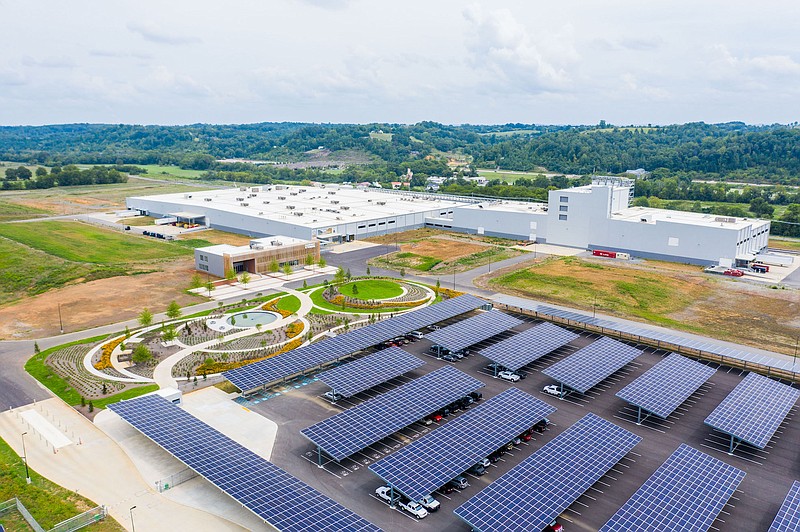Nokian Tyres' production facility in Dayton, Tennessee, is the first in the U.S. tire industry to hit a key environmental milestone, according to the company.
Nokian's tire-manufacturing building received Leadership in Energy and Environmental Design (LEED) v4 Silver certification from the U.S. Green Building Council, said Wes Boling, a company spokesman.
"We've long been a global leader in sustainability. It's one of our core values," he said about the Finland-based tire company that a year ago opened its $360 million production plant in Rhea County.
Boling said other tire-makers have had training or similar facilities earn the LEED v4 Silver mark, but not the factory building itself.
Also, Nokian has built a new solar array at the Dayton site where it draws much of its daily electricity. The 3-megawatt panels can generate about 4,000 megawatt-hours of solar energy each year, which is enough to power more than 500 homes, according to Nokian.
In addition, the company said it has opened an eco-friendly, 26,000-square-foot administration building on its 135-acre campus. The solar array fully powers the administration building and some of the processes in the production facility, Boling said.
Nokian Tyres Construction Manager David Korda said the LEED certification and new administration building showcase "our passion for our employees and the environment."
"We believe these areas of growth display what Nokian Tyres is all about," he said in a statement.
Boling said the company, which employs between 100 and 150 employees in Dayton, is still on track to produce 4 million tires per year by 2023. Nokian also is aiming to have 400 employees on board.
"Soon we're going to a two-shift system," Boling said, noting it's starting a night shift.
He said that while the coronavirus created challenges for company, and Nokian shut production for a period earlier in the year, the pandemic has not altered its long-term strategy.
While the market for tires took a downturn for a while, Boling said that consumers delayed purchases.
"We've seen the beginning of a V-shaped" recovery, he said. Boling said that winter is usually the company's best sales period given its history of expertise in producing those tires, even though it's aiming to grow its all-season business.
The company spokesman said the company earned LEED v4 Silver certification thanks to a range of sustainable elements including smart building automation, eco-friendly building materials, efficient water and waste management systems, electric vehicle charging stations in the parking lot and renewable energy generation.
According to Nokian, it designed the factory to minimize harmful emissions while producing tires with sustainability in mind. The company excludes harmful high-aromatic oils from its tire compounds, and it has reduced the rolling resistance of its products by an average of 8% since 2013, which is equivalent to the exhaust fumes of 65,000 cars annually.
The company said it has reduced carbon dioxide emissions at its global production facilities by 44% in the last six years.
Contact Mike Pare at mpare@timesfreepress.com. Follow him on Twitter @MikePareTFP.
